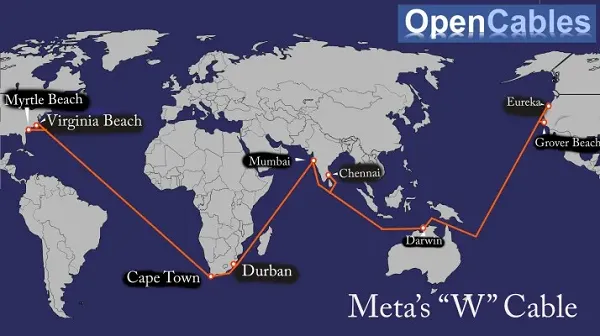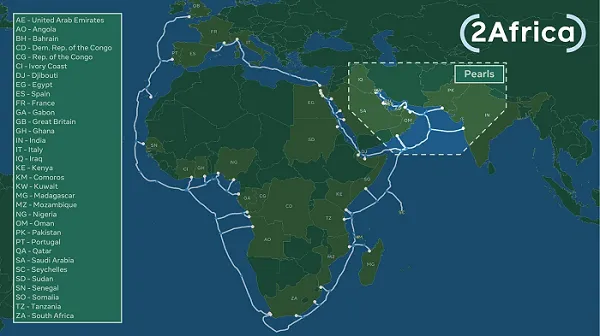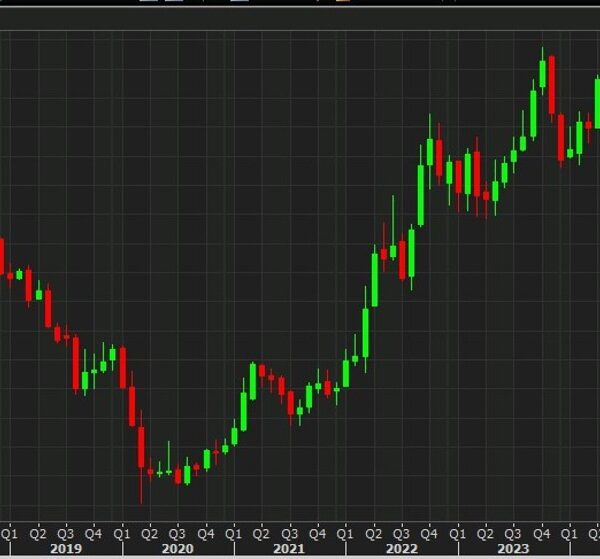It’s interesting to consider our reliance on subsea cables to power global connectivity, and the susceptibility of such to sabotage, in various ways, which could jeopardize entire industries.
That’s what came to mind upon hearing of Meta’s latest subsea cable project, which will see the company invest more than $10 billion into a new initiative that will lay more than 40,000 kilometers of subsea cabling, in order to expand connection capacity in more regions.
As reported by TechCrunch:
“The planned route of the cable, says sources, currently sees it spanning from the east coast of the U.S. to India via South Africa, and then to the west coast of the U.S. from India via Australia – making a “W” shape around the globe.”

As you can see in this diagram, the “W” cable project would give Meta connectivity to almost every continent, and would build upon Meta’s past “2Africa” cabling project which focused on Africa specifically.

The two projects would effectively give Meta ownership of a global network of data, though the “W” project is expected to be the first time that Meta will seek to go it alone on a major subsea project.
On the 2Africa project, Meta partnered with various regional providers to facilitate broader connection, open to a range of services. The proposal for this new cable is more individual, with Meta taking control of its own network, which would primarily power expanded connectivity in India, for a broader push on AI and VR in the region.
That could eventually mean that Meta has more control over how its cable is used, and more leverage over these regions more broadly. In essence, that would also mean that Meta has more sway over the increasingly valuable Indian market, and it’ll be interesting to see how Indian authorities react to the plan, and what they require of Meta to approve such.
And as noted, there is also the question of susceptibility of subsea cables, to natural phenomena for one (sharks apparently love to chew on subsea cabling), but also to state-sanctioned sabotage and attack.
Last week, reports emerged that a Chinese commercial ship had recently been accused of deliberately dragging its anchor to cut undersea cables, at the behest, allegedly, of Russian operatives.
As reported by The Wall Street Journal:
“International investigators reportedly believe the crew aboard Yi Peng 3, a bulk carrier full of Russian fertilizer, dragged its anchor for more than 100 miles across the Baltic seabed, damaging the cables that run across it. Two different internet links – one between Sweden’s Gotland Island and Lithuania, and another between Finland and Germany – stopped working earlier this month, prompting the investigation by authorities from all four countries and other nations.”
It’s concerning that entire nations can be effectively cut off by such actions, but then again, there’s not really any alternative to power expanded connection across borders.
Maybe, in future, satellite connectivity will supersede physical cables, but we’re not there yet. And maybe, given that Starlink is one of the leaders on that front, there’ll be a level of hesitancy there as well, given that it’s controlled by a politically divisive billionaire, who may or may not use such for his own benefit.
It’s an interesting consideration in the broader scheme of things, as the internet becomes a more critical element in modern life.
And as such, it’s providers, and owners of such, that will hold sway, which may be what Meta’s going for in this instance.












